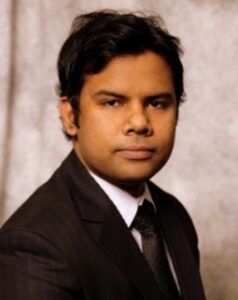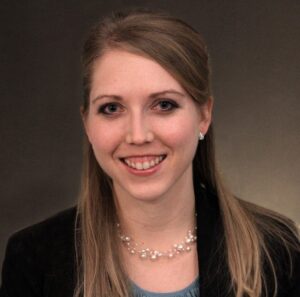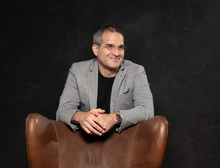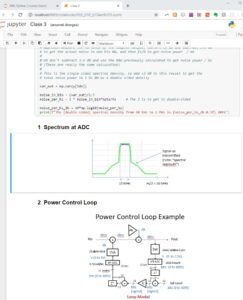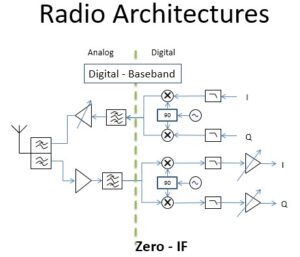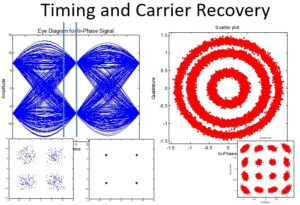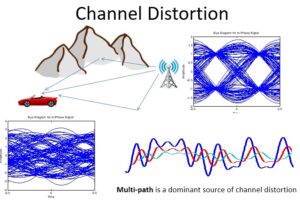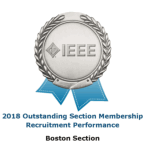IEEE Boston Section
News & Announcements!
IEEE Boston Section – Call for Committee Volunteers!
Upcoming Events!
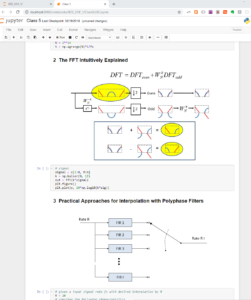 This long-running IEEE Course has been updated to include Jupyter Notebooks which incorporates graphics together with Python simulation code to provide a “take-it-with-you” interactive user experience. No knowledge of Python is required but the notebooks will provide a basic framework for proceeding with further signal processing development using that tools for those that have interest in doing so. This course will not be teaching Python, but using it for demonstration. A more detailed course on Python itself is covered in a separate IEEE Course “Python Applications for Digital Design and Signal Processing”. Students will be encouraged but not required to load all the Python tools needed, and all set-up information for installation will be provided prior to the start of class. Target Audience: All engineers involved in or interested in signal processing applications. Engineers with significant experience with DSP will also appreciate this opportunity for an in-depth review of the fundamental DSP concepts from a different perspective than that given in a traditional introductory DSP course. Benefits of Attending/ Goals of Course: Attendees will build a stronger intuitive understanding of the fundamental signal processing concepts involved with digital filtering and mixed signal analog and digital design. With this, attendees will be able to implement more creative and efficient signal processing architectures in both the analog and digital domains. The knowledge gained from this course will have immediate practical value for any work in the signal processing field. Topics / Schedule: Pre-recorded lectures: (3 hours each) will be distributed Friday prior to each week’s workshop dates. Workshop/Q&A Sessions are 6 – 7:30PM on the dates listed below. Kick-off / Orientation: Thursday, April 18, 2024 Class 1: April 25, 2024: Correlation, Fourier Transform, Laplace Transform Class 2: May 2, 2024: Sampling and A/D Conversion, Z –transform, D/A Conversion Class 3: May 9, 2024: IIR and FIR Digital filters, Direct Fourier Transform Class 4: May 16, 2024: May Windowing, Digital Filter Design, Fixed Point vs Floating Point Class 5: May23, 2024: Fast Fourier Transform, Multi-rate Signal Processing, Multi-rate Filters
This long-running IEEE Course has been updated to include Jupyter Notebooks which incorporates graphics together with Python simulation code to provide a “take-it-with-you” interactive user experience. No knowledge of Python is required but the notebooks will provide a basic framework for proceeding with further signal processing development using that tools for those that have interest in doing so. This course will not be teaching Python, but using it for demonstration. A more detailed course on Python itself is covered in a separate IEEE Course “Python Applications for Digital Design and Signal Processing”. Students will be encouraged but not required to load all the Python tools needed, and all set-up information for installation will be provided prior to the start of class. Target Audience: All engineers involved in or interested in signal processing applications. Engineers with significant experience with DSP will also appreciate this opportunity for an in-depth review of the fundamental DSP concepts from a different perspective than that given in a traditional introductory DSP course. Benefits of Attending/ Goals of Course: Attendees will build a stronger intuitive understanding of the fundamental signal processing concepts involved with digital filtering and mixed signal analog and digital design. With this, attendees will be able to implement more creative and efficient signal processing architectures in both the analog and digital domains. The knowledge gained from this course will have immediate practical value for any work in the signal processing field. Topics / Schedule: Pre-recorded lectures: (3 hours each) will be distributed Friday prior to each week’s workshop dates. Workshop/Q&A Sessions are 6 – 7:30PM on the dates listed below. Kick-off / Orientation: Thursday, April 18, 2024 Class 1: April 25, 2024: Correlation, Fourier Transform, Laplace Transform Class 2: May 2, 2024: Sampling and A/D Conversion, Z –transform, D/A Conversion Class 3: May 9, 2024: IIR and FIR Digital filters, Direct Fourier Transform Class 4: May 16, 2024: May Windowing, Digital Filter Design, Fixed Point vs Floating Point Class 5: May23, 2024: Fast Fourier Transform, Multi-rate Signal Processing, Multi-rate Filters 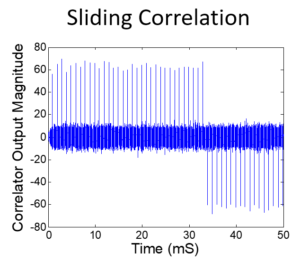
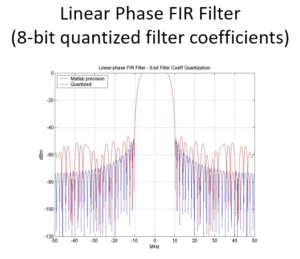
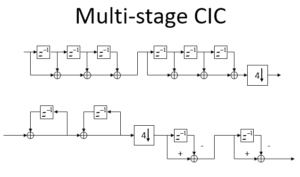 Speaker’s Bio: Dan Boschen has a MS in Communications and Signal Processing from Northeastern University, with over 25 years of experience in system and hardware design for radio transceivers and modems. He has held various positions at Signal Technologies, MITRE, Airvana and Hittite Microwave designing and developing transceiver hardware from baseband to antenna for wireless communications systems. Dan is currently at Microchip (formerly Microsemi and Symmetricom) leading design efforts for advanced frequency and time solutions. For more background information, please view Dan’s Linked-In page at: http://www.linkedin.com/in/danboschen Registration is open through the last live workshop date. Live workshops are recorded for later use.
Speaker’s Bio: Dan Boschen has a MS in Communications and Signal Processing from Northeastern University, with over 25 years of experience in system and hardware design for radio transceivers and modems. He has held various positions at Signal Technologies, MITRE, Airvana and Hittite Microwave designing and developing transceiver hardware from baseband to antenna for wireless communications systems. Dan is currently at Microchip (formerly Microsemi and Symmetricom) leading design efforts for advanced frequency and time solutions. For more background information, please view Dan’s Linked-In page at: http://www.linkedin.com/in/danboschen Registration is open through the last live workshop date. Live workshops are recorded for later use. Announcement
IEEE Technology and Engineering Management (TEM) Chapter, CO-SPONSORED BY Life Members Affinity Group (LMAG), Boston Chapter
Remote:
Zoom Session (registered participants will be validated & enabled to join via ZOOM link below)
Please Register via IEEE Tools
- IEEE Members – Free
- TEM Members – Free
- LMAG Members – Free
- Non-IEEE Members– Free
- Prior Registration – Encouraged and will be appreciated
Agenda:
- 7:00 – 7:05 PM Introduction
- 7:05 -7:10 PM TEM and LMAG Chair’s announcements
- 710 – 810 PM Speaker presentations on Cyber Security for Engineers
- 810 – 825 PM – Audience / Speakers Q & A
- 825 – 830 PM – Final remarks and wrap-up
Speaker:
Navid Mohammad Imran, University of Memphis
Navid Mohammad Imran – University of Memphis
He has successfully developed a real-time machine intelligence system for vehicle navigation and , autonomous vehicle control system, global product distribution system, industrial parts distribution system, manufacturing automation control system. Navid has earned Bachelors and Masters degree in computer science from the University of Memphis at Tennessee.
Areas of research in Computer science are Control Engineering, Cyber-Physical Systems, Machine Learning and Software Engineering and Object Oriented Programming
Current: Phd Student at the Computer Science Department, University of Memphis, Tennessee
Publications spans Intelligent Systems, Computer Vision, Logistics, Transportation
Moderator: Dr. Karthik Ganesan, Program Director, Cognizant Technology Solutions. Dr. Karthik Ganesan is the American Program Director for Business Consulting and Enterprise IT at Cognizant Technology Solutions, a NASDAQ listed, Fortune 500 US corporation. He manages a multimillion dollar portfolio of services for corporate customers, leading globally distributed teams to provide domain knowledge and technical services.
Dr. Ganesan’s experience spans applying optimization and domain knowledge skills to manufacturing, supply chain, logistics and retail operations in large corporations. As a domain leader, he manages teams spread across the USA, Latin America, Europe and India for delivering business and IT projects. He focuses on solving logistics operations and supply chain management and manufacturing problems faced by his customers. He is responsible for leading the business center in implementing full-life cycle solutions to his customers within competitive, time constrained contractual terms. Prior to taking this industry position, he spent over a decade in graduate level teaching and research in both engineering and business schools. His research work spans, Linear Optimization, Scheduling, Routing, and Migration of Enterprise Applications to Multi-core Cloud He is an IEEE senior member, inducted into HKN Eta Kappa Nu professional board and mentors grad students.
Technical Activities Board: Ananda Chakravarty is Vice President for IDC Retail Insights, responsible for the Retail Merchandising and Marketing Analytics Strategies practice. Mr. Chakravarty’s core research covers in-store and digital retail merchandising, digital tools, artificial intelligence, intelligent store operations, retail marketing, and retail media. It includes application of data and data analytics for retail including pricing, tech, and decision making. Ananda builds actionable strategic research focused on retail business merchandising and marketing.
For over 25 years, Ananda has served across the retail spectrum in strategic roles. He drove retail product management at Staplesand Talbots, served as an executive at top retail technology vendors such as Oracle Retail and Diebold Nixdorf, and influenced the retail industry as a former analyst at an IDC competitor. Mr. Chakravarty started his digital career with digital business pioneer,Monster.com and drove innovation at The Hartford.
Co-Organizer Lori Jeromin is currently chair of the LMAG, Boston Chapter. Lori’s research works has received enormous amounts of scholarly citations and reads, including High-data-rate error correcting coding. She received a B.S. in Mathematics from Bucknell University, and an S.M. in Electrical Engineering from Massachusetts Institute of Technology. She has been at the Massachusetts Institute of Technology’s Lincoln Laboratory since 1978, working on optical and RF spread spectrum MILSATCOM.
Registrations: To expedite sign-in for the meeting, we ask that everyone — members as well as non-members — pre-register for the meeting online. Pre-registration is available until 6pm before the meeting. If you cannot pre-register, you are welcome to register by sending an email to Karthik at KGAN2040@gmail.com and Lori
IEEE Technology and Engineering Management (TEM)
Society, Boston Chapter
National: The Engineering Management Society (EMS) was founded in 1951, becoming the Technology Management Council (TMC) in 2007. In 2015 we transitioned to the Technology and Engineering Management Society, (TEMS). The Boston TEMS Chapter has been technically approved by Section and awaiting approval of IEEE HQ.
Vision, Mission, Values athttp://www.ieeetmc.org/node/23
Membership:https://www.ieee.org/membership-catalog/productdetail/showProductDetailPage.html?product=MEMTEM014
Boston TEMS Chapter: Technology and Engineering Management (TEM) Society, Boston Chapter is for Engineering Managers and Executives from Engineering, Science and Technology based companies. All those aspiring to become proficient and powerful Leaders are welcome. We aim is to provide knowledge to make strategic and critical decisions. We draw upon real-life scenarios from across the spectrum of engineering specialties. Our meetings will serve those looking to Manage Engineering Programs, Projects and Technologies. You can learn from leaders, get mentored by experts, share experiences and network with accomplished professionals.
Leadership is an action, not simply a position. The IEEE Life Members Committee (LMC), a Joint Committee of IEEE and the IEEE Foundation, provides leadership and support to Life Members (including future Life members) in all activities regarding IEEE. The LMC is also responsible for the administration of the Life Members Fund in support of activities that are of professional concern and interest to Life Members.
For more details and engage with LMAG https://life.ieee.org/get-involved/affinity-groups/connect-with-a-group/
Antennas & Propagation Society
Zoom link will be sent to registrants before the event.
Next-generation wireless RF systems are expected to contain multi-functional, highly flexible, and tightly integrated front-ends for achieving agile use of the frequency spectrum. In the past decade, this has led to research on filtering antennas, or filtennas, in which the functionality of the antenna and filter is combined into a single highly integrated module that achieves the function of both components with a higher-order transfer function. These filtennas can have improved performance, size, and cost. Furthermore, by incorporating frequency-agility, a filtenna can provide adaptation to changing radio environments. One of the challenges in realizing a reconfigurable filtenna is that two dissimilar elements need to be tuned in tandem.
This presentation covers recent developments in the design of reconfigurable filtennas in the S-band (2-4 GHz) and X-band (8-12 GHz). The filtennas are based on using evanescent-mode cavities as the backing for slot antennas. A discussion of available tuning mechanisms and the challenges of going from S-band to X-band is included. Second-order reconfigurable filtenna proof-of-concept prototypes are shown in both frequency bands. The prototype filtennas are created using commercially available printed circuit board materials and tuning elements and measured in an anechoic chamber. The S-band filtenna can continuously tune from 2 to 2.6 GHz while achieving a realized gain between 2.7 to 5.2 dB, respectively. The X-band filtenna demonstrates tuning from 9.6 to 11.1 GHz, with a maximum gain of 5 dB. Overall, with the demonstrated performance, these elements are promising components for future wireless communications and radar systems.
Biography:
Jessica E. Ruyle (M’05–SM’16) was born in Shawnee, OK USA in 1984. She received a B.S. degree in electrical engineering from Texas A&M University, College Station in 2006 and an M.S and Ph.D. degree in electrical engineering from the University of Illinois at Urbana-Champaign in 2008 and 2011 respectively.
From 2006 to 2011, she was a Graduate Research Assistant at the University of Illinois at Urbana-Champaign. From 2012 to 2019, she was an Assistant Professor with the School of Electrical and Computer Engineering, University of Oklahoma, Norman. In 2019 she was promoted to Associate Professor in Electrical and Computer Engineering at the University of Oklahoma. She is an Advanced Radar Research Center (ARRC) member at the University of Oklahoma (OU). She holds two patents for her antenna designs. Her research interests are in the development and characterization of new electromagnetic devices and platforms such as antennas and packaging to improve the performance of radiating systems in challenging environments.
Prof. Ruyle is a member of Tau Beta Pi and Eta Kappa Nu. She is the recipient of a DARPA Young Faculty Award for her work in highly conformal, placement insensitive antennas and was named a William H. Barkow Presidential Professor at OU. She is also an IEEE Senior Member and an Associate Editor for IEEE Antennas and Wireless Propagation Letters.
IEEE Boston/Providence/New Hampshire Reliability Chapter
FREE In Person and Virtual Event
Measuring the Reliability of new technology is critical for any development team. Accelerated Life Testing (ALT) measures a new product’s life by testing at elevated stresses. It saves valuable time & resources; giving teams the right information rapidly. Join this webinar to get an overview of ALT and a few tips and tricks to ensure you avoid common pitfalls.
Measuring the Reliability of new technology is critical for any development team. Accelerated Life Testing (ALT) measures a new product’s life by testing at elevated stresses. It saves valuable time & resources; giving teams the right information rapidly. Join this webinar to get an overview of ALT and a few tips and tricks to ensure you avoid common pitfalls.
Agenda:
5:30 PM Pizza, salad, soft drinks, and Networking
6:00 PM Technical Presentation
6:45 PM Questions and Answers
7:00 PM Adjournment
Biography: Adam Bahret of Apex Ridge Reliability Consulting
Adam Bahret is the founder of Apex Ridge Consulting and a leading reliability expert who writes, speaks and coaches engineering teams on reliability as a competitive edge. His reliability strategy has delivered millions in savings for clients while mitigating risk and forming a foundation for reliability-fueled growth and brand dominance. His clients range across multiple industry segments, including medical devices, robotics, semiconductor, aerospace, consumer, and automotive.
Adam works with technical teams to improve the design while mentoring leadership teams in adopting the processes, language, and behaviors to build a reliability culture. He also introduces key reliability metrics such as “time-to-reliability” that guide organizational thinking and build a robust reliability culture that’s the hallmark of dominant top-performing technology companies.
Adam is the author of three books on reliability engineering: Devastate the Competition, How to Take Market Share Through Robust Design (2023), Reliability Culture, How Leaders Build Organizations that Create Reliable Products (Wiley 2021), and How Reliable is Your Product, 50 Ways to Improve Product Reliability (2nd Ed 2016). Adam has also released a series of small handbooks on specific reliability tools called “Adam’s The Perfect Reliability Tool” book series. “The Perfect HALT”, “The Perfect Accelerated Life Test”, “The Perfect Reliability Growth Test”, and “ The Perfect DFMEA.”
Adam has deep technical expertise and over 25 years of experience in product development and reliability engineering. He has an MS in Mechanical Engineering from Northeastern University, is an ASQ nationally certified reliability engineer, and an international speaker on technology, leadership, and product development. More information on Adam and Apex Ridge can be found at www.adambahret.com.
The meeting is open to all. You do not need to belong to the IEEE to attend this event; however, we welcome your consideration of IEEE membership as a career enhancing technical affiliation.
There is no cost to register or attend, but registration is required (so that we may purchase enough food!)
Registration: https://events.vtools.ieee.org/m/415811
COURSE DESCRIPTION
Digital Signal Processing (DSP) for Software Radio
Course Kick-off / Orientation 6:00PM – 6:30PM EDT; Thursday, June 13, 2024
First Video Release, Thursday, June 13, 2024. Additional videos released weekly in advance of that week’s live session!
Live Workshops: 6:00PM – 7:30PM EDT; Thursdays, June 20, 27, July 11, 18, 25
Registration is open through the last live workshop date. Live workshops are recorded for later use.
Course Information will be distributed on Thursday, June 13, 2024 in advance of and in preparation for the first live workshop session. A live orientation session will be held on Thursday, June 13, 2024.
Attendees will have access to the recorded session and exercises for two months (until August 20, 2024) after the last live session ends!
IEEE Member Early Rate (by May 30th): $190.00
IEEE Member Rate (after May 30th): $285.00
IEEE Non-Member Early Rate (by May 30th): $210.00
IEEE Non-Member Rate (after May 30th): $315.00
Decision to run/cancel course: Thursday, June 6, 2024
Speaker: Dan Boschen
This is a hands-on course combining pre-recorded lectures with live Q&A and workshop sessions in the popular and powerful open-source Python programming language.
Pre-Recorded Videos: The course format includes pre-recorded video lectures that students can watch on their own schedule, and an unlimited number of times, prior to live Q&A workshop sessions on Zoom with the instructor. The videos will also be available to the students for viewing for up to two months after the conclusion of the course.
Course Summary
This course builds on the IEEE course “DSP for Wireless Communications” also taught by Dan Boschen, further detailing digital signal processing most applicable to practical real-world problems and applications in radio communication systems. Students need not have taken the prior course if they are familiar with fundamental DSP concepts such as the Laplace and Z transform and basic digital filter design principles.
This course brings together core DSP concepts to address signal processing challenges encountered in radios and modems for modern wireless communications. Specific areas covered include carrier and timing recovery, equalization, automatic gain control, and considerations to mitigate the effects of RF and channel distortions such as multipath, phase noise and amplitude/phase offsets.
Dan builds an intuitive understanding of the underlying mathematics through the use of graphics, visual demonstrations, and real-world applications for mixed signal (analog/digital) modern transceivers. This course is applicable to DSP algorithm development with a focus on meeting practical hardware development challenges, rather than a tutorial on implementations with DSP processors.
Now with Jupyter Notebooks!
This long-running IEEE Course has been updated to
include Jupyter Notebooks which incorporates graphics together with Python simulation code to provide a “take-it-with-you” interactive user experience. No knowledge of Python is required but the notebooks will provide a basic framework for proceeding with further signal processing development using that tools for those that have interest in doing so.
This course will not be teaching Python, but using it for demonstration. A more detailed course on Python itself is covered in a separate IEEE Course routinely taught by Dan titled “Python Applications for Digital Design and Signal Processing”.
All set-up information for installation of all tools used will be provided prior to the start of class.
Target Audience:
All engineers involved in or interested in signal processing for wireless communications. Students should have either taken the earlier course “DSP for Wireless Communications” or have been sufficiently exposed to basic signal processing concepts such as Fourier, Laplace, and Z-transforms, Digital filter (FIR/IIR) structures, and representation of complex digital and analog signals in the time and frequency domains. Please contact Dan at boschen@loglin.com if you are uncertain about your background or if you would like more information on the course.
Benefits of Attending/ Goals of Course:
Attendees will gain a strong intuitive understanding of the practical and common signal processing implementations found in modern radio and modem architectures and be able to apply these concepts directly to communications system design.
Pre-recorded lectures (3 hours each) will be distributed Friday prior to each week’s workshop dates. Workshop / Q&A sessions are 6:00PM – 7:30PM on the dates listed below.
Kick-off / Orientation: Thursday, June 13, 2024
Topics / Schedule:
Class 1: Thursday, June 20: DSP Review, Radio Architectures, Digital Mapping, Pulse Shaping, Eye Diagrams
Class 2: Thursday, June 27, 2024: ADC Receiver, CORDIC Rotator, Digital Down Converters, Numerically Controlled Oscillators
Class 3: Thursday, July 11, 2024: Digital Control Loops; Output Power Control, Automatic Gain Control
Class 4: Thursday, July 18, 2024: Digital Control Loops; Carrier and Timing Recovery, Sigma Delta Converters
Class 5: Thursday, July 25, 2024: RF Signal Impairments, Equalization and Compensation, Linear Feedback Shift Registers
Speaker’s Bio:
Dan Boschen has a MS in Communications and Signal Processing from Northeastern University, with over 25 years of experience in system and hardware design for radio transceivers and modems. He has held various positions at Signal Technologies, MITRE, Airvana and Hittite Microwave designing and developing transceiver hardware from baseband to antenna for wireless communications systems and has taught courses on DSP to international audiences for over 15 years. Dan is a contributor to Signal Processing Stack Exchange https://dsp.stackexchange.com/, and is currently at Microchip (formerly Microsemi and Symmetricom) leading design efforts for advanced frequency and time solutions.
For more background information, please view Dan’s Linked-In page at: http://www.linkedin.com/in/danboschen
IEEE Boston Section recognized for Excellence in Membership Recruitment Performance
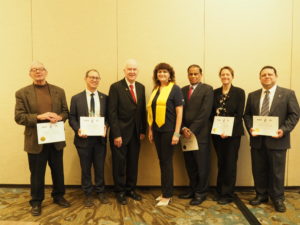
IEEE Boston Section was founded Feb 13, 1903, and serves more than 8,500 members of the IEEE. There are 29 chapters and affinity groups covering topics of interest from Aerospace & Electronic Systems, to Entrepreneur Network to Women in Engineering to Young Professionals. The chapters and affinity groups organize more than 100 meetings a year. In addition to the IEEE organization activities, the Boston Section organizes and sponsors up to seven conferences in any given year, as well as more than 45 short courses. The Boston Section publishes a bi-weekly newsletter and, currently, a monthly Digital Reflector newspaper included in IEEE membership.
The IEEE Boston Section also offers social programs such as the section annual meeting, Milestone events, and other non-technical professional activities to round out the local events. The Section also hosts one of the largest and longest running entrepreneurial support groups in IEEE.
More than 150 volunteers help create and coordinate events throughout the year.
Click here to join our email list!

